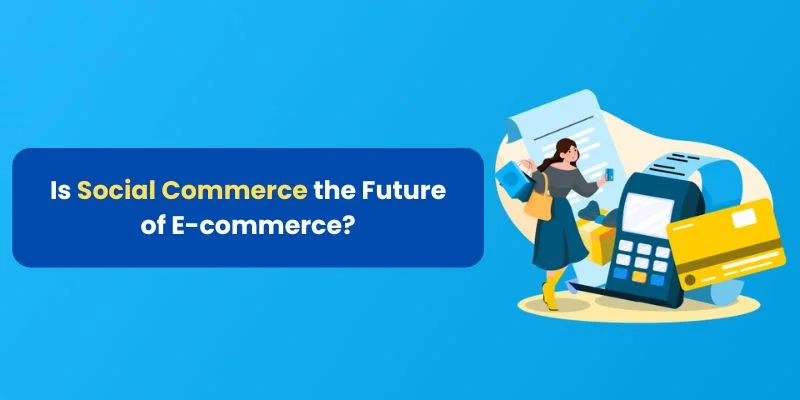
The convenience and accessibility that online purchasing offers to people worldwide has revolutionized consumer behavior. A significant force in recent years has emerged: social commerce, which blends social networking with online buying. “Is social commerce the future of E commerce?” is a question that emerges with the increasing significance of social media platforms and the growing desire for customized shopping experiences. Let’s discuss how Social Commerce is the future of the E-commerce field.
Why is E-commerce the future?
E-commerce platforms are getting more advanced as technology develops, providing a wide range of products, customized shopping experiences, and the flexibility to purchase whenever and whenever. Due to improvements in internet connectivity and the proliferation of mobile devices, online shopping is now easier than ever. E-commerce is the way of the future because it adapts easily to the changing digital environment and meets the increasing needs of consumers in terms of accessibility, speed, and convenience. This is why Ecommerce is the future. An MBA in Business Analytics in Chennai can provide knowledge of using data analytics, enhancing e-commerce strategies to better meet consumer demands and drive future growth.
Technologies that improve customer happiness and trust include augmented reality, artificial intelligence, and secure payment channels. Businesses are investing more in digital transformation due to realizing the cost-effectiveness and expanded market reach that e-commerce offers. Due to this, the popularity of e-commerce suddenly went down; rather, it represents a fundamental change in how we live, work, and buy, and it represents a time when the internet will play a major role in the world economy.
Social commerce vs E-commerce
Let’s explore features for Social Commerce vs Ecommerce.
E-commerce
E-commerce is buying & selling goods and services online through websites and marketplaces. Key features include:
- Dedicated Online Stores: Companies create websites or list their products for sale on sites like Shopify, eBay, and Amazon.
- Direct Transactions: Consumers visit these sites, browse products, and purchase directly.
- Marketing Channels: Traditional digital marketing methods like SEO, email marketing, and paid advertisements drive traffic to e-commerce sites.
- Customer Interaction: Limited to the shopping and checkout process, with some follow-up through email or customer service.
Social Commerce
Social commerce combines the social media experience with e-commerce, allowing users to buy products directly within social media platforms. Given below are the key features that make Social Commerce an e commerce future:
- Integrated Shopping Experience: Platforms like Instagram, Facebook, and Pinterest allow users to browse, discover, and purchase products without leaving the app.
- Social Interaction: Users can engage with brands, see what friends are buying, read reviews, and get recommendations based on social connections.
- Influencer and Peer Recommendations: By utilizing the credibility of social media celebrities, influencers and user-generated content are important drivers of sales.
- Seamless Shopping: The process is integrated into the social media experience, making it easy for users to transition from discovery to purchase.
How is Social Commerce the Future of E-Commerce?
Social commerce is the fusion of e-commerce and social media platforms, allowing users to search, find, and buy goods and services straight from social media applications. By fusing social networking and online shopping, social commerce creates a smooth online shopping experience in a social setting. Social commerce increases engagement and purchases using user-generated content, social recommendations, and user influence. An MBA Digital Marketing in Chennai can provide the expertise needed to effectively harness these strategies, maximizing the impact of social commerce initiatives for businesses.
Let’s delve into why Social Commerce is considered the future of E commerce.
The Evolution of Social Media and Its Impact
With billions of users globally, social media plays a vital role in people’s daily lives. Communication, sharing, and content discovery have all been transformed by websites such as Facebook, Instagram, and Pinterest. Because consumers turn to their social networks for ideas, opinions, and product suggestions, social media has an impact on consumer behavior. Due to social media’s extensive usage, businesses are now able to leverage this influence and employ social commerce to convert it into sales.
Benefits for Businesses
There are several ways in which businesses might benefit from social commerce. To begin with, it provides a direct channel for connecting with and interacting with their intended audience. Companies may create a customized and engaging shopping experience by interacting with customers, sharing updates, and promoting products in real-time. This is one of the reasons why Social Commerce is the future of E commerce. Furthermore, social commerce facilitates establishing trust and credibility for businesses by utilizing user-generated content, including endorsements, reviews, and influencer partnerships.
Improvement of the Customer Shopping Experience
Social commerce enhances customers’ shopping experiences in several ways. First, it provides an easy and practical way to make purchases. Users can find products, read reviews, and make purchases from the same platform, saving them the trouble of switching between many apps or websites. Second, social commerce enables users to get personalized recommendations related to their preferences, past purchases, and social media relationships.
In the ever-evolving landscape of digital shopping, social commerce is emerging as a compelling vision for the future of e commerce. By blending social media’s immersive and interactive nature with seamless shopping experiences, social commerce is reshaping how consumers discover and purchase products. You can gain knowledge in Social Commerce by opting for MBA Colleges in Chennai. The distinctions between social interaction and e-commerce are becoming less clear as social media platforms develop and incorporate more sophisticated shopping functions, resulting in a single, dynamic market.
Authored by Priya S.
I like researching current advancements and ideas in the business and technology domains. In order to find out how to launch an exciting career, please connect with me on LinkedIn.
